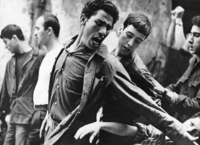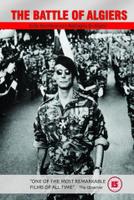 Peter's Nite
Peter's NiteSalad, Pizza, Warm (ish) Apple Pie
The Guardian: Few fictional films look more like documentary than Gillo Pontecorvo's The Battle of Algiers, and very few indeed which have this kind of socio-political structure and recount old, half-forgotten conflicts have achieved such lasting fame.
We know, of course, that Algeria was eventually liberated from the French, but Pontecorvo relegates that to an epilogue. He concentrates instead on the years between 1954 and 1957 when the freedom fighters regrouped and expanded into the casbah, only to face a systematic attempt by French paratroopers to wipe them out. His highly dramatic film is about the organisation of a guerrilla movement and the methods used to decimate it by the colonial power.Its stance is as fair as any such film could be, despite the fact that Pontecorvo was a member of the Italian communist party at the time and thus was implicitly on the side of the independence movement. There is, though, no caricature and no glamorisation of either side - just a feeling of palpable horror evoked by urgent images and Ennio Morricone's dramatic but never melodramatic score. Pontecorvo sees the colonialists as victims of their own system, and the rebels as taking on some of the excesses used against them.
In one scene, a group of ordinary people, French and Algerian, are enjoying coffee and conversation near the casbah when a rebel bomb explodes among them. The shock of this sequence is even worse than the scenes of the French using torture.
The film is preceded by a message from the film-maker stating that "not one foot" of newsreel footage was used, but Marcello Gatti's grainy, black-and-white camera work in the actual locations of the struggle, and the pioneering use of a hand-held camera for the crowd scenes, makes it seem as if events are being recorded as they occur. The mixture of amateurs and professionals in the cast works admirably too.

Bombs and Boomerangs - Peter Matthews: "....the filmmakers initially developed their project with Paul Newman in mind.
He would portray a handsome, cultivated bon vivant, once a paratrooper in Indochina, now a magazine reporter assigned to cover France’s latest imperial adventure in the Casbah. We can purely speculate on the rest—how our hero’s journalistic sangfroid might have crumbled before the worst Gaullist outrages, his vanity and complacency challenged by self-scrutiny, doubt, and progressive awareness of guilt. Then he would, perhaps, experience the birth of consciousness and a final, ardent dedication to the rebel cause. Whether Pontecorvo and Solinas held these or other cards up their sleeves, the resulting movie would almost certainly have been a compromise. You can understand the logic.A “difficult” subject demands the warranty of a box-office name to pacify backers and entice a wide audience, who will hopefully learn a thing or two. But the fact remains that Parà (the title of Solinas’ original treatment) is a story about Paul Newman’s inner turmoil and only secondarily relates the far more ponderable misery of the Algerian people. That was the trenchant critique posed by Salah Baazi, a representative of the exiled Front de Libération Nationale (FLN), when he arrived in Italy to discuss the script. FLN military chief Saadi Yacef had envisaged his own revolutionary epic and with Baazi, was now shopping around for a suitable director. The collaborators had sidelined the independence movement in dramatizing its impact on a single European (to be played by an American). Baazi submitted an alternative script written by Yacef, which Pontecorvo rejected in turn as “sickeningly propagandistic.” Clearly a new approach was needed that would avoid the reciprocal snares of well-meaning foreign patronage and indigenous saber-rattling—bring the anger and grim resolve of the combatants viscerally close, but preserve a critical distance. In short, a creative synergy between First and Third Worlds."
Kevin Beary: Like many other Italian communists who left the party in disgust at the Soviet invasion of Hungary, however, Pontecorvo did not abandon his communist convictions. Which brings us to Battle of Algiers. Algerian independence was declared and recognized in 1962, and Pontecorvo and his collaborator Franco Solinas, Bignardi writes, were "fascinated by the events and their ideological implications, convinced that the anti-colonial struggle was an urgent and important subject, almost a symbol and model for the political struggle against ‘an invincible capitalism in Italy,’" as Solinas put it in an interview.
In 1964, a representative of military head of the FLN leader Jacef Saadi (who in the film plays the part of the FLN commander Kader) arrived in Italy looking for a leftist director to make a film about the struggle for Algerian independence and decided on Pontecorvo. In 1965, the government of Algeria gave the director "not only all the necessary permits to shoot the film in Algiers, but put at his disposal – though not completely without charge – the Algerian army for the crowd scenes."


No comments:
Post a Comment